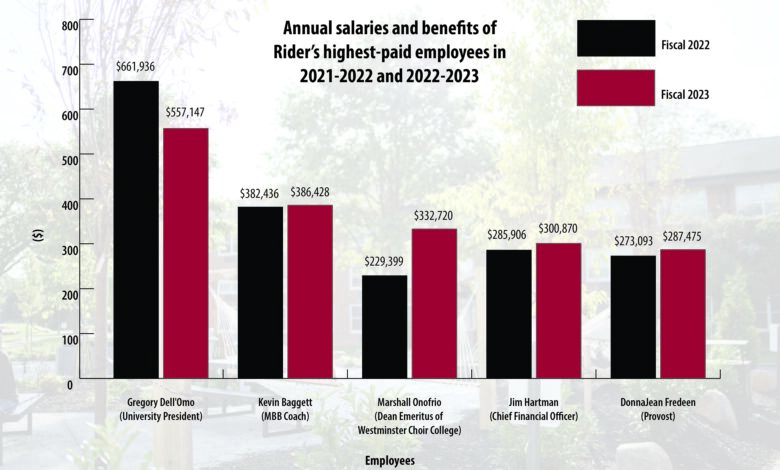
Dell’Omo sees $104,789 drop in pay, tax forms show
By Jake Tiger
RIDER President Gregory Dell’Omo deferred and cut $104,789 of his salary and benefits in fiscal 2023 while many of the university’s other top earners saw slight pay increases amid Rider’s ongoing financial crisis, according to the university’s most recent federal tax forms.
Salary insights
Rider tax forms show that in fiscal 2023, which spanned July 1, 2022 to June 30, 2023, Dell’Omo’s salary and benefits totaled $557,147, his lowest sum since fiscal 2016, when he joined the university.
Dell’Omo’s pay cut followed a momentary bounce-back during fiscal 2022, when he received $661,936 in salary and benefits, a $56,420 boost after his trimmed salary during the COVID pandemic.
According to Rider Chief Financial Officer Jim Hartman, part of Dell’Omo’s recent salary drop was deferred compensation and some was an outright pay cut. Hartman did not offer specifics as to how much was cut and how much was deferred.
The CFO added that Dell’Omo’s deferred compensation was “baked into his contract” years ago, and the decrease was not a reaction to the university’s financial situation at the time, as the forms also show that the university had a $22 million deficit at the end of fiscal 2023.
The forms reveal that Rider’s five highest paid employees in fiscal 2023 were Dell’Omo, men’s basketball Head Coach Kevin Baggett at $386,428, Dean Emeritus of Westminster Choir College Marshall Onofrio at $332,720, Hartman at $300,870 and Provost DonnaJean Fredeen at $287,475. All four received pay increases.
During fiscal years 2023 and 2024, faculty received no pay raises. This year, faculty will receive 0.25% salary increases.
Hartman said the administrative raises for people like himself and Fredeen were more of a “correction,” offsetting prior pay cuts they had taken since the pandemic.
Onofrio, who retired from the university in 2022, is an outlier in the group, as his pay shot up by $103,321 after making $229,399 the year prior. Hartman clarified that Onofrio’s salary spike came from the voluntary separation incentives and the pay out of his accrued vacation time.
Onofrio did not respond to a Sept. 2 email from The Rider News seeking comment on his pay.
Deficit worsened
On a broader scale, Rider’s tax forms showed a deficit of approximately $23 million at the end of the fiscal 2023, $11 million more than the previous year. On July 27, 2023, the start of fiscal 2024, Dell’Omo held a webinar detailing his new plan for the university’s future, dubbed “The Path Forward.” This webinar, according to the president himself, is “an aggressive, comprehensive approach” with goals to get Rider back to a positive operating balance by fiscal 2026.
The university’s 2023 revenue of $196 million was its lowest since at least 2011. Fiscal 2023 also marked a $23 million decrease from from 2022, according to ProPublica’s database of Rider tax forms.
Conversely, Rider’s 2023 expenses were its lowest since 2015, both years matching at $219 million, according to the database. The number is indicative of Dell’Omo’s stated vision for a smaller operation that emphasizes the university’s most profitable avenues.
Dell’Omo doubled down on his “The Path Forward” plan at Rider’s staff and faculty convocation on Aug. 29, saying that he hopes to create a “smaller, more selective” university model that allows for more financial flexibility in difficult times.
Other notes
Rider tax forms showed an increased investment in outsourced marketing services, as the tax forms showed $2.1 million went to the university’s top two marketing providers, $385,495 more than the previous year.
The bulk of the marketing budget went to Princeton Partners, an agency not listed on Rider’s fiscal 2022 tax form. The local company has worked with Rutgers, Capital Health, New Jersey state agencies and more.
Kristine Brown, Rider’s vice president of external affairs, said the emphasis on marketing was part of Rider’s strategic plan from that time, which dated back to 2018, has since become the current plan: “The Path Forward. She said one of that plan’s pillars was to “raise Rider’s profile.”
“From the Board of Trustees, to Greg [Dell’Omo] … we all knew that it was necessary to make an investment in marketing,” Brown said. “We’ve made incremental investments in marketing over the past five years. We make all of the ads in house, which is a whole lot of fun.”
Rider also began paying more for the Ellucian Banner services, a company that oversees much of the university’s technology and software. In fiscal 2023, Rider paid the company just over $3 million as opposed to about $1.7 million in fiscal 2022.
Ellucian hosts many of Rider’s internal online services, including the myRider student portal, the Office of Information Technology Help Desk and the payroll service for students, Banner Web Time Entry, following issues with ADP in 2023.


